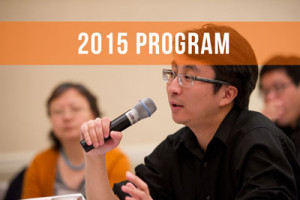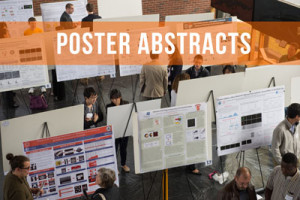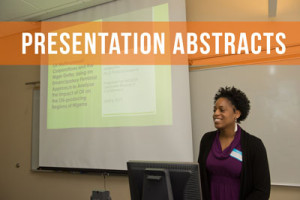
[hr]
About
General Information
Friday–Saturday, March 20-21, 2015
Life Sciences Complex, Syracuse University
Purpose
The symposium will provide a forum for graduate students to make connections with colleagues in other programs, practice conference presentation and networking skills, and get feedback on their work from an interdisciplinary audience. The perfect antidote to your “siloed” intellectual existence!
Opportunities
In addition to the research and poster sessions, the symposium will feature a series of “skill-building” seminars on such topics as
• delivering an engaging presentation,
• networking at conferences,
• designing effective posters, and
• incorporating technology into your presentation.
New this year: Presenters will have the opportunity to publish edited versions of their work online in the All-University Graduate Research Symposium Working Papers Series, with hard-copy offprints also available. This is an excellent chance to introduce yourself and your work to the wider scholarly community.
2015 Symposium
Call for Proposals
Directions
Submit your proposal online by February 15, 2015. Proposals may be submitted in more than one category. Proposals are invited in the following formats:
Individual papers/oral presentations — 15 minutes
Accepted papers/presentations will be assigned to a panel by the organizers.Your presentation may take the form of reading a fully prepared text (based, for instance, on a seminar paper or a portion of your thesis/dissertation) or talking from notes, with or without the aid of slides or other visuals (for example, describing and interpreting the results of your lab or field work, or of a publicly engaged research project). In either case, you will want to practice your presentation to make sure it is the right length (typically 6-8 pages for a 15-minute paper) and can be understood by a listening audience representing diverse fields of study.
Complete panels centering on a common theme —75 minutes
Each panel comprises of a chair and 3 or 4 speakers. If you have colleagues whose research interests overlap with your own, consider proposing a complete panel of presentations. These could be fellow students in a (current of former) graduate course, topical reading group, research lab, or dissertation writing group; panels representing multiple disciplines or methodologies are encouraged. The theme of the panel should have sufficient focus to allow connections to emerge among the individual presentations, while retaining interest for an audience lacking specialist knowledge. Chairs/moderators may also serve as panelists.
Posters (max 42” x 42”) – “Best Poster” Prize will be awarded
While not conventional in all fields, displaying a poster is a great way to communicate your research in a conference setting. If you are preparing or have already prepared a poster for a course, your lab work, or a special project, why not introduce others around the university to your research? Posters may be flat or tri-fold; stands will be available at the event. Poster presenters must be available to discuss their work during the designated poster session. A faculty panel will judge the posters on effective explanation, logical organization, and visual appeal, and present a “Best Poster” award at the conclusion of the symposium.
Roundtable sessions — 75 minutes
Roundtable sessions will comprise of a facilitator and 5-7 participants, featuring research-in-progress on related issues, topics, or problems. Participants will briefly (5 minutes) introduce their research, followed by open discussion. If your research is in too preliminary a stage for formal presentation, or you are in the process of refining your thinking and want to “workshop” your ideas in a public setting, gather some colleagues in a similar situation and propose a roundtable. Like panels, roundtables are centered around a common intellectual concern or set of questions. However, roundtables put greater emphasis on generating ideas, comparing interpretations and perspectives, and stimulating informal discussion among the participants and with the audience. Moreover, roundtables provide a ready-made occasion to find out who else on campus shares your passion on a topic!
Contact
Questions? Contact Glenn Wright, Director of Syracuse University Graduate School Programs.
Email: gradresearch@syr.edu
Phone: 315-443-3458
Conference Organizers: Can Aslan, Aaron Blasyak, ML DeFuria, Bryan Dosono, Shawn C Loner, Vijay Raj, Joonsik Yoon
[hr]


